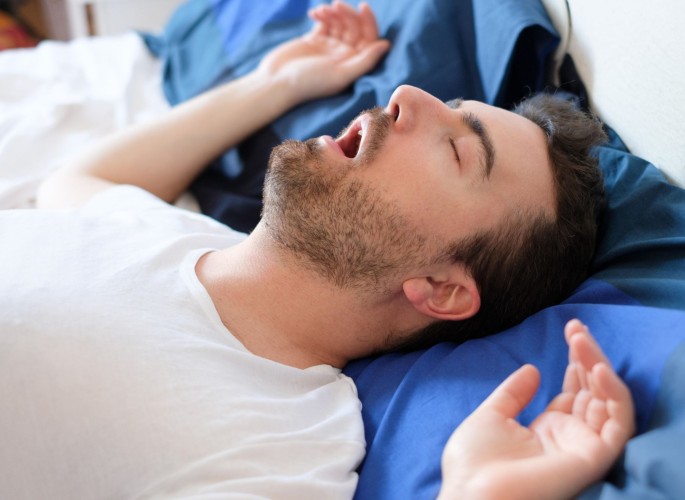There has been a lot of news about sleep apnea recently, a very dangerous condition associated with its main symptom, frequent and loud snoring. An apnea is a pause in breathing for up to 90 seconds while asleep, which can range from 5 to 100 times an hour and disrupts sleep, as the brain tries to wake up the individual to take a deeper breath. Most do not actually become conscious before breathing resumes and are thus not aware this is happening unless a partner complains about the snoring and they read something about the connection to sleep apnea. It’s no wonder that 90% of those who suffer from it have never been diagnosed.
“Cardiologists account for only 4% of Obstructive Sleep Apnea diagnoses, even though OSA patients consume significantly more cardiovascular healthcare resources and are more likely to receive a comorbid diagnosis for cardiovascular disease in the five years prior to their OSA diagnoses,” wrote Robert L. Talley, DDS, in “Dental Sleep Medicine,” a chapter in Craniofacial Pain: A Handbook for Assessment, Diagnosis and Management.
It may come as a surprise to some that dentists can address sleep apnea, but dentists are specialists in everything involving the mouth and jaw, from cavities to oral cancer. Wilshire Smile Studio is one of the few practices that has developed a true expertise in OSA and we can provide ways to reduce and control its negative impact (Central Sleep Apnea or CSA is a brain disorder that affects just 5% of total sleep apnea patients and has to be treated by a physician).
A recent study found that 13% of men had moderate to severe cases of OSA and another 14% mild ones, while just 6% of women had moderate or severe cases and 5% mild. Men 40 and above (especially older than 65) are especially at risk. Why?
The Centers for Disease Control and Prevention notes that men are more likely to be obese, which is a risk factor for sleep apnea. They tend to find comfort in lying on their back and the tongue, tonsils, and other mouth tissues are also oversize and more likely to block to the airway and trigger repeated apneas.
The combination also results in snoring, with a quarter of those who do so being habitual, including four out of 10 men and three out of 10 women. “Men are more likely to than women to snore due to different muscle structure in the neck and throat, as well as hormonal factors,” according to Verywellhealth.com.
Another higher risk factor for the obese that generally applies to men is a neck size of 17.
It should be no surprise that many athletes, including Shaquille O’Neill, have been treated for sleep apnea.
The American Sleep Apnea Association reported that sleep apnea causes damage to the brain, including memory loss, cognitive decline, and inability to concentrate. Other effects can include asthma and weaker bones and teeth.
According to WebMD, sleep apnea also significantly raises the risk for erectile dysfunction, clinical depression, all forms of cardiovascular disease, diabetes, and Alzheimer’s disease.
The constant interruption of sleep results in extreme tiredness without the individual realizing just how dangerous this can be in driving to work. A study of traffic accidents found that the risk of being in a motor vehicle accident was significantly higher for those suffering from OSA. Even if arriving safely, he or she will find it hard to stay awake in meetings or remember things.
The standard treatment for OSA and CSA is a CPAP (Continuous Positive Airway Pressure) machine. This involves wearing an oxygen mask all night while lying on the back and can be so uncomfortable that 25-50% of all users eventually discontinue it, according to Dr. Talley. He notes that oral appliances that dentists can create for patients have been approved by the American Academy of Sleep Medicine as a good alternative for patients with mild to moderate cases who do not tolerate CPAP.
Wilshire Smile Studio can customize the best of these FDA-approved oral appliances which keep the airway open.
Sometimes sleep apnea can occur because of a dislocation of the temporomandibular joints (TMJ), the hinges that connect the lower jaw to the skull (which you can feel working if you put your fingers in front of your lower earlobes and open and close your mouth). We can design an orthotic split that you would wear to gradually adjust the jaw back to its normal and comfortable position. Sometimes the dislocation can be due to a bite misalignment that can be corrected by dental work.
These are some of these other common contributing factors to sleep apnea or signs that you may be suffering from it,
°Nasal congestion.
°Deviated septum.
°Drinking alcohol two hours before bedtime.
°Anxiety or irritability.
°Reduced reaction time.
°Smoking.
°Insomnia.
°Frequent need to urinate during the night.
°Migraine headaches in the morning.
°Waking up choking, a sore throat, or with the sensation that there is “cotton” in your mouth (all caused by mouth breathing to offset inadequate breathing through the nose).
If you suspect you may have sleep apnea, set an appointment ASAP with a Wilshire Smile Studio dentist for an examination and discussion.

